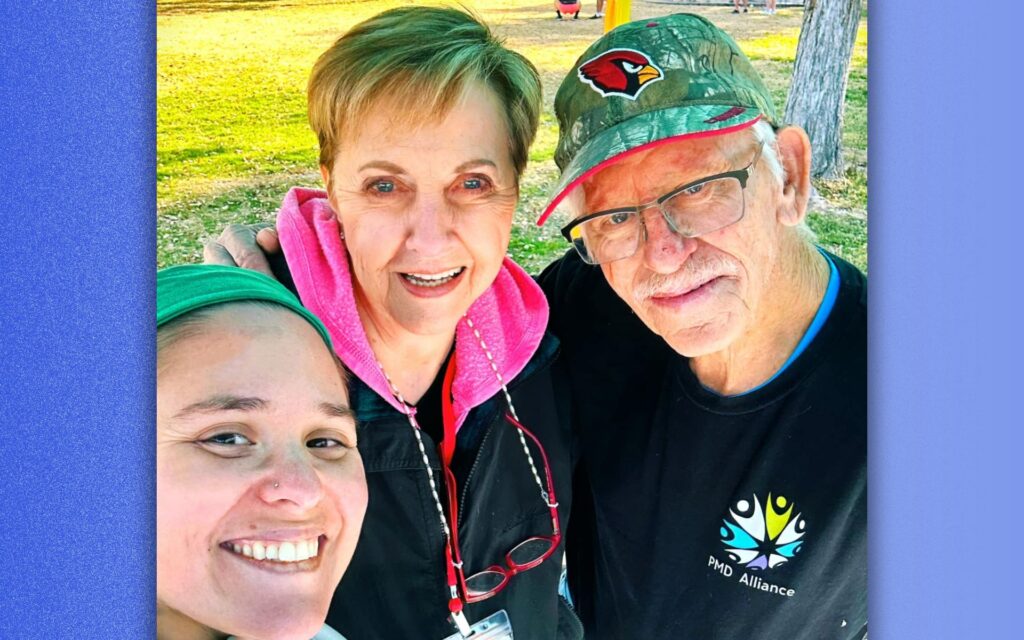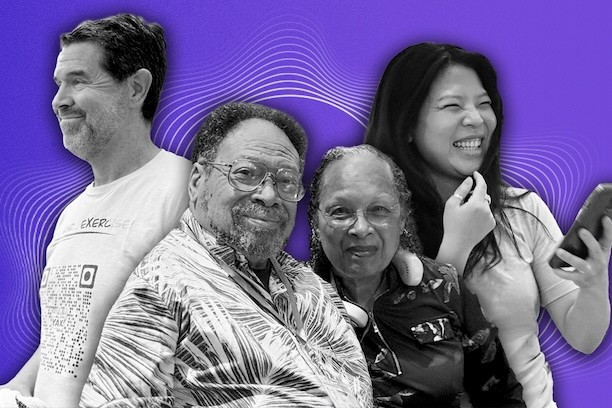Even in our darkest moments, there can exist a sliver of light. When Judy Reynolds retired at age 63 and moved from Tucson, AZ, to Phoenix to be near her grandkids, she described her life as “just okay.” Away from her job and her friends, she found herself listless. “I loved being near my son and his kids,” she said, “but I didn’t really feel like I had anything to do.” And then there was that pesky issue with her feet. An avid runner and hiker, Judy started scaling back to walking because her feet just weren’t working the way they used to. “Life was okay,” she said, “but I was bored.”
Nine years later, she woke up with a twitch in two fingers in her right hand. When it kept coming back, a visit to her primary care doctor turned into an appointment with the neurologist, which turned into a diagnosis: Parkinson’s disease. It was “total shock.” But that diagnosis—unexpected and unwanted—would propel her into a whole other life and a reminder that it’s never too late to discover who you are.
When Judy left the neurologist’s office, she had a diagnosis but little sense of what to do. “I remember sitting in my car, not feeling anything,” she said. “What’s my next step?” She drove home and turned on her computer. “I wanted to know what I was dealing with,” she said. “I don’t advise this, but I started searching ‘Parkinson’s.’” She waded through the stages of Parkinson’s, dropping into the proverbial rabbit hole, before a rope appeared to help lift her out: a Parkinson’s support group popped up in the midst of her search and, as fate would have it, the nearby group was meeting the following week.
Judy was hesitant. “I wasn’t the kind of person who joins groups like that,” she said. “I thought it’d be a bunch of old people complaining.” But, ever-curious, she decided to go, promising herself that if she didn’t like it, she never had to go back.
The first time Judy raised her hand at a support group and someone passed her the microphone, her hands started shaking—and it wasn’t a tremor. Ever since she was a kid, Judy was “petrified” of public speaking. But the thing about Judy is that she’s innately inquisitive. And, it turns out, so was her friend Jane.
Jane and Judy met at that first support group and, at the time, they were the only two women with Parkinson’s in the group. “We both had this curiosity,” Judy said, “to understand what we were dealing with. We’d find information and call each other to share it. And anything locally we could find, we would go.”
A few months in and they were overflowing with information—and they were “dying to share it.” Judy said, “We would sit in these meetings and when someone would have a question or concern that no one could answer, Jane and I would have the answer.” She felt a responsibility to speak up. “I couldn’t hold back any longer,” she said. Even as her hands shook, she grabbed the microphone and leaned in.
During her career, Judy worked with computers in network security. When I asked her if she considered herself a leader in her work, she immediately rebuffed me, “No, no,” she said. “I was one of those fake-it-till-you-make-it people.”
It was the 1990s when someone came into her office to network the company’s computers for the first time. “In those days,” she said, “there were no IT people. You couldn’t go to college to study IT. I was of the generation where if you knew how to do it, you got the job..” When the man sent in to network their computers for the day packed up to leave, Judy asked what would happen after he left. “You’ll need to hire a network administrator,” he said. This was Judy’s spark.
She found an evening class at a local college called, “How to Fix Your Own PC,” and she signed up. “I wanted to know how things worked,” she said, and she was amazed to realize how easy it was. Several months later, a computer issue came up at work. Her boss, pinched for time by an unexpected meeting, couldn’t get it done. Judy surprised him by saying, “I can do it.” And she did. She eventually convinced her boss to let her take the training class to become a network administrator. And just like that, she launched her new career.
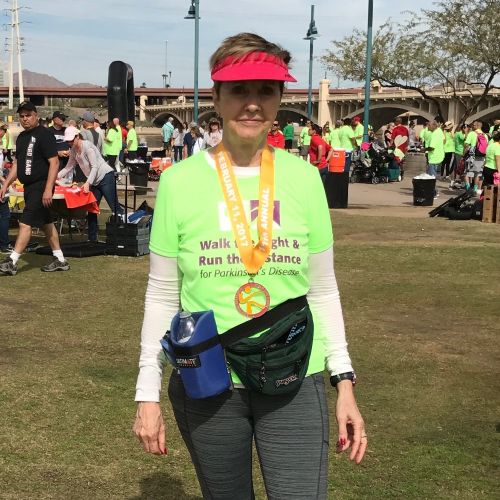
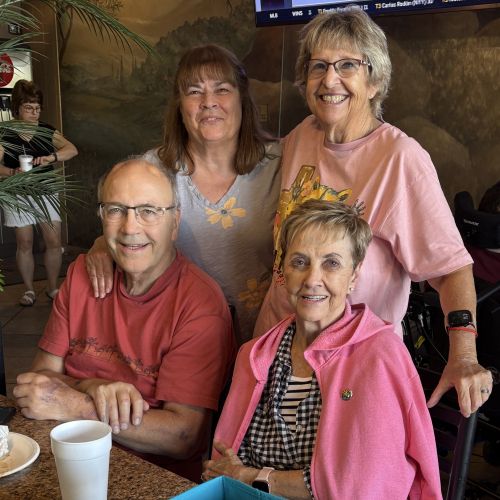
After speaking up at that first meeting, Judy kept raising her hand. At the very first Parkinson’s conference she attended, she listened to a doctor call upon attendees to join a new study. The researchers were seeking people who were newly diagnosed and not yet on medication. Judy fit the bill. “Here I am,” she said, raising her hand. Within a few months of her diagnosis, she had joined her first drug study. She’s been in eight or nine trials since then and has become a proponent of clinical trials with her peers—another reason to keep speaking up.
Around this time, Judy saw a flyer for a new organization that was offering free pizza at an upcoming gathering for people with movement disorders. Once again, Judy said yes. It was there that she met Sarah Jones, the founder of PMD Alliance. “We were so impressed with Sarah,” she said. “We really got attracted to her mission.”
In fact, what Judy loved about PMD Alliance was their sense of zest. “Enthusiasm was the message,” she said. “PMD Alliance really wanted to give us the power to manage our own Parkinson’s, not just wait until the doctor told us what to do. Their message was one of hope.” Oftentimes, Judy felt forgotten as the patient, an afterthought. But with PMD Alliance, she felt front and center. “Doctors only have 10 minutes for you every six months, but PMD Alliance let us talk to someone about what we were dealing with.” And it wasn’t just people with Parkinson’s; Judy saw care partners being shown “equal status in the assistance being offered.”
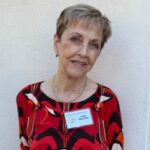
“PMD Alliance really wanted to give us the power to manage our own Parkinson’s, not just wait until the doctor told us what to do.”
But what PMD Alliance offered Judy was more than a message of hope; it was action—and the support to back up that action. Fueled by PMD Alliance’s resources and online and in-person trainings specifically for community and support group leaders, Judy found more ways to step into her voice and into leadership. Today, she is all in, volunteering her time as a PMDAmbassador and a local support group leader. (In fact, Judy laughed as she added, “the PMD Alliance ice breaker cards have saved my ass I don’t know how many times when I’m sitting there in a group and no one’s saying anything. They’re terrific. I use them all the time.”)
For Judy, what once felt impossible has become second-nature. She is a leader, and her impact is enormous.
Judy doesn’t wish this disease upon anyone but, through it, she has rediscovered herself. “I have a reason now,” she said. “I have a purpose.” At 82, Judy says she’s too far in her disease to qualify for most clinical trials. But, recently, when she attended a PMD Alliance online program where researchers were recruiting for a new study, Judy’s interest was piqued. She thought to herself, “There’s no way my group will be able to participate; we’re mostly too old.” But, that Friday, she brought it to her support group anyway. When she asked the group if there was anyone new, a couple raised their hands. Turns out, the new man with Parkinson’s was a fit for the trial and he’s already been accepted into the study. Judy said, “I think to myself, ‘I did that.’ He’s relatively young and I got him involved in something positive right away. That makes me feel really good.”
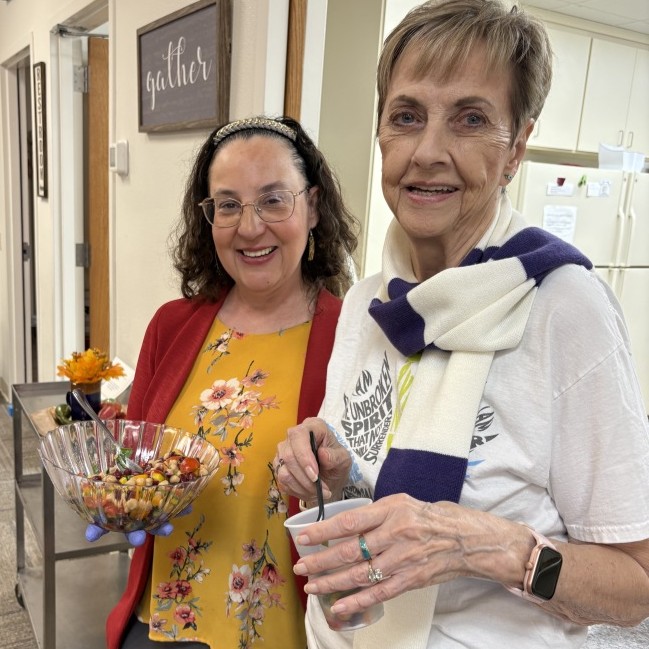
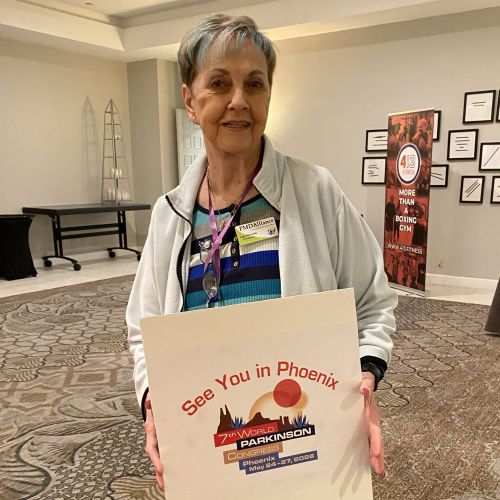
Years ago, Judy used to watch her brother, a leader in his field, give talks. “He’s the sweetest guy,” Judy said. “Everyone he meets just loves him. He can charm anyone. And I used to listen to him and think, ‘Wow, how did he get like this?’ But, recently, I feel I’ve become him in some way. When I walk into that room for our meetings on a Friday morning and I start talking to everyone, I become this person that I didn’t know was in me. I had to wait until I was 81 or 82 years old before I discovered I had this capability. Why did it take me all these years to find out?”
As she spoke, Judy sounded delighted, delighted to see herself in this fullness, in bloom. “When I’m dying,” she said, “I can look back and say I’ve made a difference in some people’s lives. When I sit in that room on a Friday morning, it’s nice to know everyone who showed up doesn’t have to worry about being stared at or someone not knowing. This is the one place they can come and be themselves.” When Judy first saw that advertisement for a local support group all those years ago, she was hesitant. But that group—and all the groups since—have changed her, offered her deep friendships, and helped her carve out her own impact in the community.
“Support groups don’t have to be unhappy places,” she said. “I think the support group system has saved so many people.”

